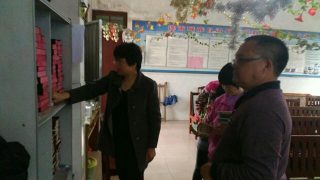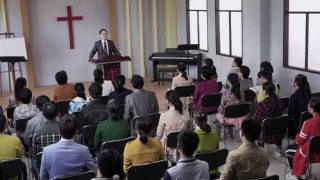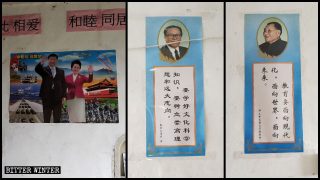Prohibited from believing in God themselves, Party members and officials are pledging to watch for and persecute all religious activities.
Li Mingxuan
Religious suppression has become an essential political mission for the CCP. Officials on the grassroots level, like village-level Party functionaries, are demanded to play an active role in crackdowns on the religionists because of their first-hand knowledge of the ways of residence in these small communities. But first of all, Party members are disallowed to have even the slightest connection to religion and are punished for any misstep in controlling religious activities.
Officials cover up their religious beliefs
In April, a town in Mudan district of Heze city in the eastern province of Shandong convened a meeting for all Party members who were warned not to participate in any religion-related activities. The requirement was to be observed by all their family members as well. If anyone is caught, they will be reprimanded or even relieved of all their duties and expelled from the Party, depending on the situation.
One of the attendees revealed that a Party secretary from one of the villages was publicly reprimanded at the meeting because he contributed 3,000 RMB (about $ 430) for a temple fair. He was also made to write a self-criticism note – a conventional means to rebuke and humiliate people in China. The local authorities also decided to investigate the temple under the question to check if there were names of Party members on its donor recognition plaque.
Some Party members and officials that have previously donated money toward the building of temples became anxious. To keep their posts, they decided to hide their names on donor plaques, which resulted in the plaques at many temples being altered beyond recognition.
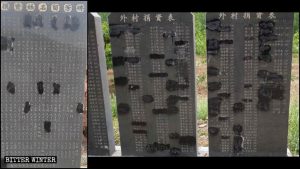
In late March, the Provincial Commission for Discipline Inspection Steering Group was coming to the Mengyin county, under the jurisdiction of Shandong’s Linyi city, to investigate the religious status of Party members. Those officials whose names were inscribed by the temples thanking for their monetary donations decided to act fast: Within a short time, donor recognition plaques of many temples in the county were destroyed. Some temples’ owners resisted the destruction, so they covered up the plaques with various fire prevention or environmental protection signs and slogans to conceal the officials’ names.
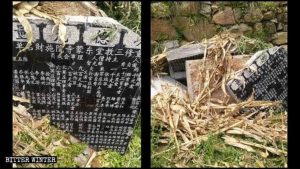
“If the provincial inspection team finds out that Party members and officials have given money to build temples and have even had their names engraved on donor recognition plaques, their Party membership will be revoked, and they will be relieved of their duties on the spot,” said a village official.
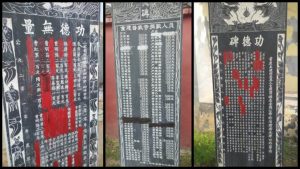
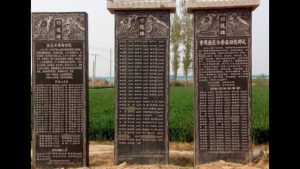
At the same time, Party members and officials in Shangqiu city in the central province of Henan also painted over their names on temple donor recognition plaques to save their careers.
Officials forced to sign pledges and guarantees
The authorities have also adopted high-pressure policies to force Party members and officials in each village to crack down on religion proactively.
In March, Yongcheng city government in Henan demanded that Party members and officials in each village under the city’s jurisdiction sign a pledge, guaranteeing that no private religious meeting venues are functioning in the area. The officials were given the task of reporting about the activities in venues that belong to the Underground Catholic Church and Protestant house churches, as well as the groups listed as xie jiao. Anyone failing to report will be expelled from the Party or otherwise punished.
According to a village director, a religious assistance officer was assigned to each village; they all had to sign a Village Assistance Officer Work Responsibility Statement of Commitment that demands them to regularly visit religious activity venues to inspect them, follow the sermons’ content, and intervene if any violations are discovered. The officers are to patrol the area frequently and prevent the construction of religious statues or the establishment of private meeting venues and other similar incidents, and promptly report it to their superiors. They should also watch for and report any out-of-town preachers, persons that are members of any xie jiao organizations, and religious venues that receive or provide accommodation to foreigners as well as any activities that are intended to engage new believers.
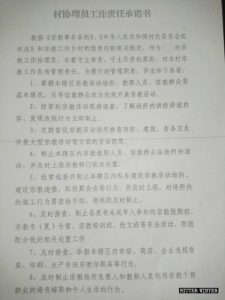
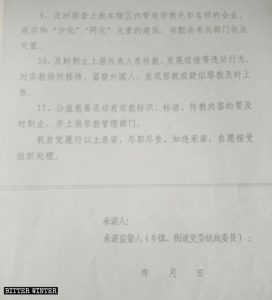
The village director added that meetings regarding the issue of religious belief are held very often. “Now, every religious denomination is being restricted. Upon discovering private gatherings of three to five people, a fine of 50,000 RMB [about $ 7,200] will be imposed. If crosses are found in the homes of Christians, their minimum living subsidy, grain subsidy, and other basic living allowances will all be revoked.”
source:BITTER WINTER/Li Mingxuan
